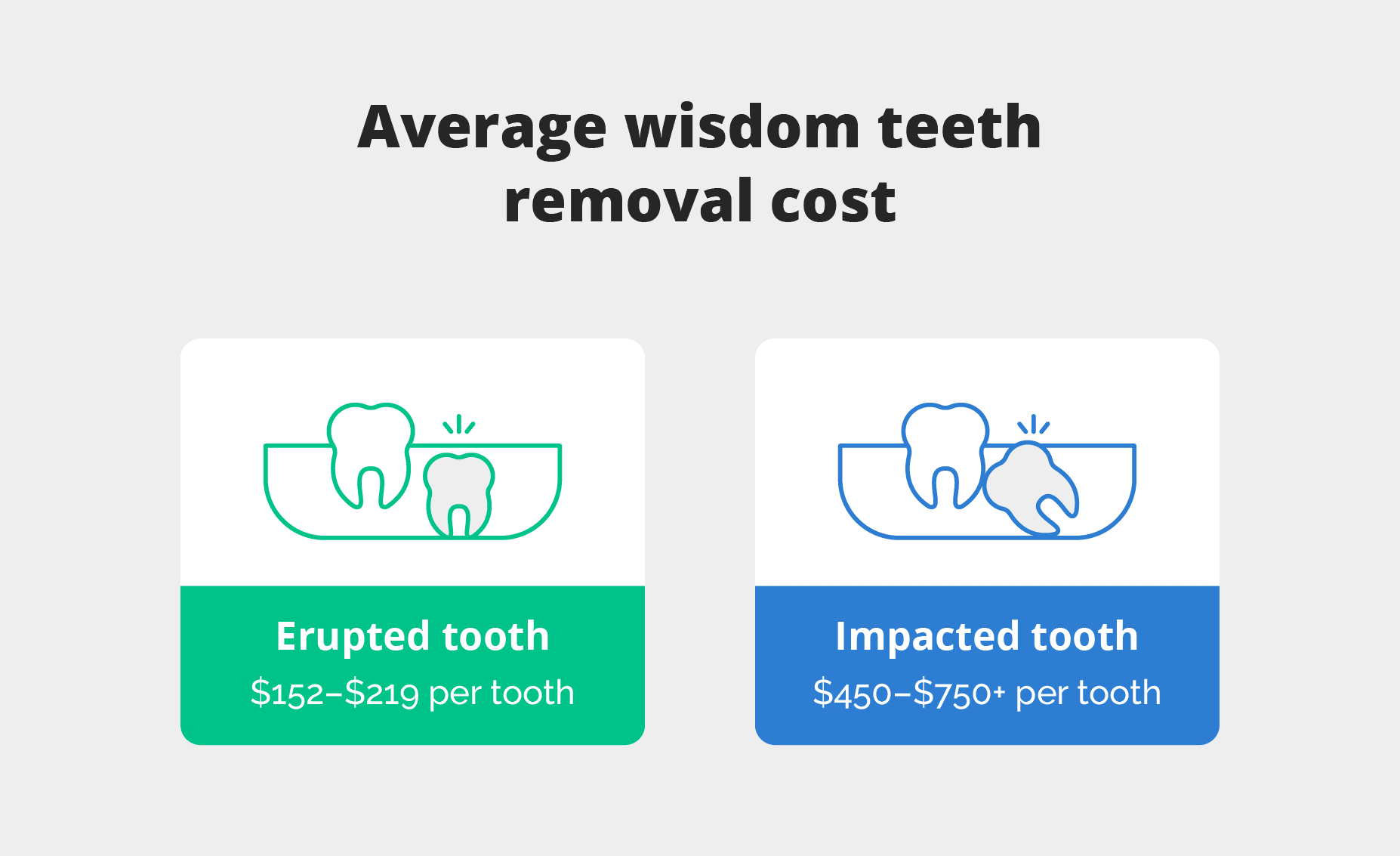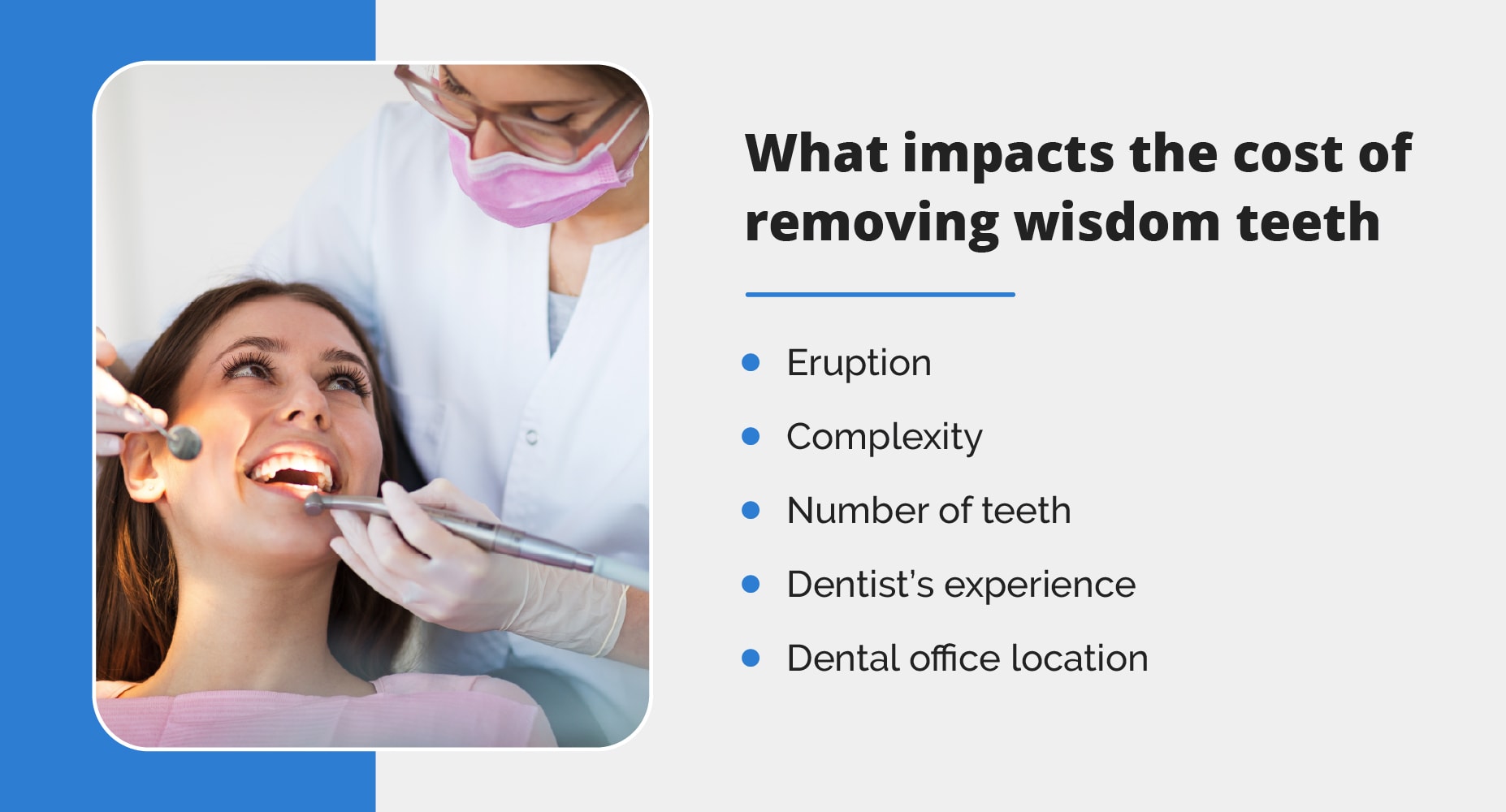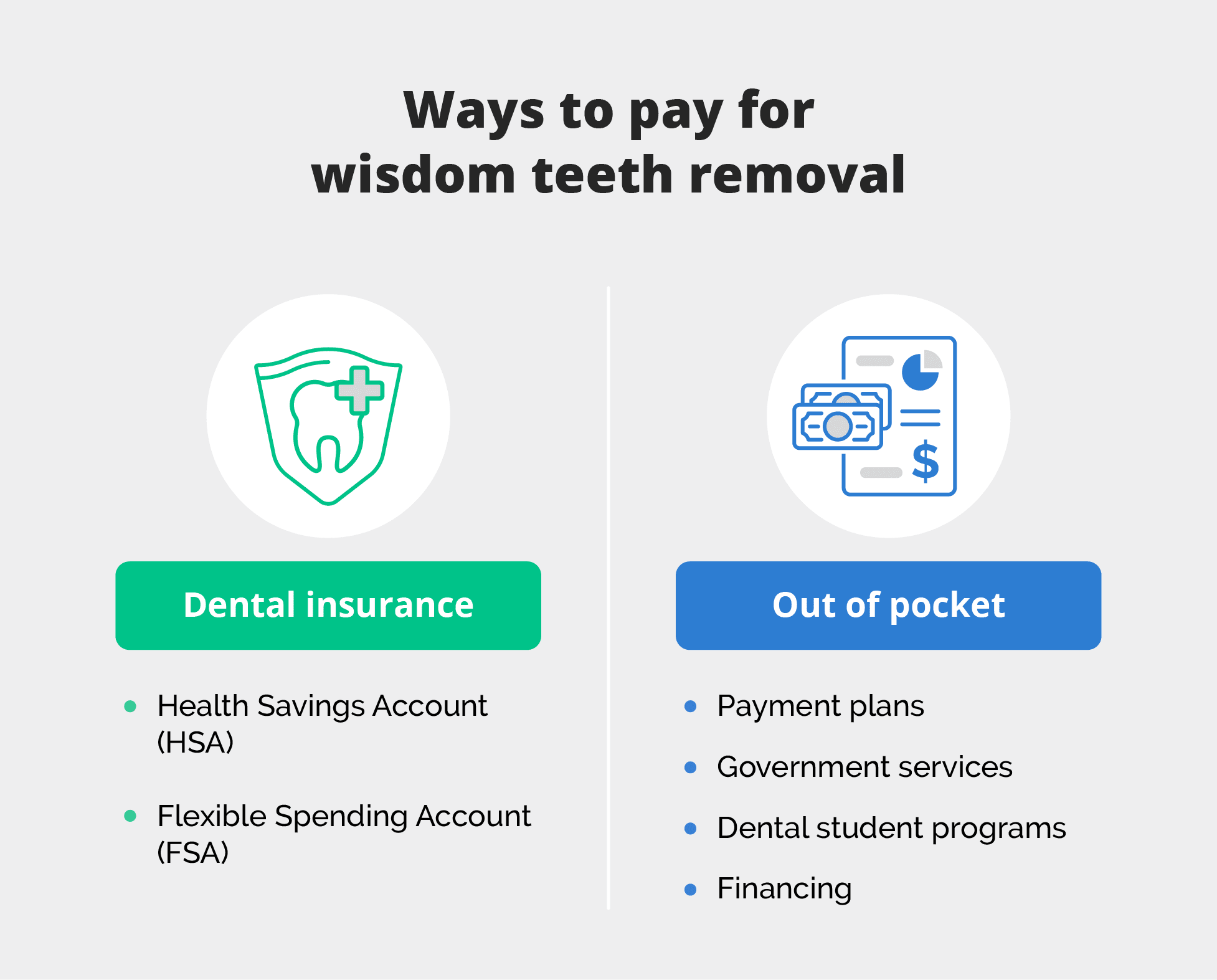The average wisdom tooth removal costs $152–$825 in Canada, but this may differ depending on a variety of factors like the complexity of removal, the number of wisdom teeth removed, and your location. There may be other costs associated with your wisdom tooth removal, such as consultations, anesthetics (sedation) and prescription medication, as well as follow-up appointments.
The cost of having wisdom teeth removed can vary widely depending on several factors, including the complexity of the extraction, how many teeth need to be removed, the region where the procedure is performed, and whether or not a patient has dental insurance coverage.
In this post, we’ll walk you through wisdom tooth removal cost by type, factors that impact cost, and ways you can pay for your procedure.

Wisdom tooth removal cost by extraction type
Wisdom tooth extractions can vary in complexity, and the type of extraction needed depends on factors like the tooth's position, alignment, and potential complications.
Your location can also play a role in how much your wisdom tooth removal costs. For example, in Alberta, the average cost to remove a tooth ranges from $127 to $751+, but in Ontario, the average cost ranges from $116 to upwards of $634 or more.
There are three types of wisdom tooth extractions: uncomplicated extraction, complicated extraction, and coronectomy.
| Average wisdom tooth removal cost | |
| Type | Cost per tooth |
| Uncomplicated extraction | $152 - $219+ |
| Complicated extraction | $450 - $800+ |
| Coronectomy | $116 - $187+ |
Uncomplicated extraction
An uncomplicated extraction is performed when the wisdom tooth has fully or partially erupted and is more easily accessible in the mouth. The price for an uncomplicated extraction of one tooth will usually run between $152 and $219+. If more than one tooth is extracted, there will be an additional fee per tooth.
Complicated extraction
Complicated extractions are necessary when the wisdom tooth is partially impacted or has not erupted through the gumline. These extractions are more complex and require a surgical approach, ranging from $450 to $750+ per tooth. If more than one tooth is extracted, you’ll need to pay an additional fee per tooth.
Coronectomy
Coronectomy is a procedure reserved for cases where removing the entire wisdom tooth poses a risk due to its proximity to vital structures. With a coronectomy, only the upper part of the tooth is removed, leaving the roots in place. The cost of a coronectomy is usually based on individual consideration, but you can expect to pay no less than $116 for an erupted tooth and $187 or more for a tooth that has not erupted. You’ll also need to plan for additional fees if more than one tooth is extracted.
| Average wisdom tooth extraction cost by province Prices include procedures ranging from a coronectomy to complicated extractions. | |
| Province | Average cost per tooth* |
| Alberta | $127 – $751 |
| British Columbia | $161 - $452 |
| Manitoba | $142 - $594 |
| New Brunswick | $130 – $631 |
| Newfoundland and Labrador | $130 - $648 |
| Nova Scotia | $116 - $826 |
| Ontario | $116 – $634 |
| PEI | $127 - $649 |
| Quebec | $114 - $546 |
| Saskatchewan | $114 - $598 |
| *Data not available for Northwest Territories, Nunavut, or Yukon. Based on 2023 fee guides. Costs are based on the 2023 fee guides. | |
Factors that impact cost

The overall cost of your wisdom tooth/teeth removal depends on various factors. It's essential to discuss these factors with your dentist or oral surgeon during the consultation to understand the expected cost of wisdom tooth removal in your specific situation. Here are a few things to consider:
Eruption: If the wisdom tooth has fully erupted and is easily accessible, it typically requires a simpler extraction procedure, which can be less expensive than impacted wisdom teeth. An erupted tooth may not require surgical removal, while an impacted tooth often does, increasing the overall cost.
Impaction complexity: Wisdom teeth can be classified as "soft tissue impaction" or "bony impaction," depending on whether the tooth is covered by gum tissue, bone, or both. In cases of bony impaction, where the tooth is fully encased in the jawbone, surgical removal is usually more complex and, therefore, more costly.
Number of teeth: Some people may have all four wisdom teeth removed, while others may have fewer. The more teeth that need to be removed, the more expensive it will be. Dentist’s experience: Oral surgeons specializing in surgical procedures like wisdom tooth removal may charge more than general dentists. Experienced practitioners often charge higher fees, but their expertise can also lead to a smoother procedure.
Dental office location: Dental care expenses can vary depending on location, with larger metropolitan areas typically more expensive than less populated areas.
Additional costs and procedures
In addition to the core expenses associated with wisdom tooth/teeth removal, there are several supplementary costs and procedures to consider, including:
Consultation: A consultation with your oral surgeon or dentist is typically the initial step, where you will formulate a treatment plan and discuss estimated costs.
X-rays: X-rays may be necessary to evaluate the positioning and condition of your wisdom teeth, especially if the teeth aren’t erupted.
Sedation: Depending on the complexity and your preference, you and your dentist may agree that sedation is required. Different levels and types of sedation are available, each with varying costs.
Prescription medications: Your oral surgeon may prescribe medications for pain management and infection prevention post-surgery.
Follow-up appointment: You may need to schedule a follow-up appointment to monitor your healing progress and ensure optimal recovery.
How to pay for wisdom teeth removal

The cost of wisdom tooth/teeth removal can be a concern for many people, but there are several methods and resources available to help manage these expenses.
1. Dental insurance
Dental insurance can play a major role in relieving the financial burden of wisdom tooth/teeth removal. While specific coverage details can vary widely based on your insurance plan, they typically cover at least a portion of the procedure's cost.
Dental insurance usually includes a deductible, co-payments, and annual maximums, so it's important to understand the details of your your policy. Some policies may cover a significant percentage of the extraction cost, while others may only provide a limited benefit.
It's essential to verify whether your insurance plan covers wisdom tooth/teeth removal and to what extent. You may also want to plan ahead, as certain insurance policies may require a waiting period before covering certain procedures.
Health Savings Account (HSA): HSAs allow account holders to set aside pre-tax money to pay for qualified medical expenses, including dental care. You can invest and grow the funds in an HSA and later use them to cover current or future medical expenses.
Flexible Spending Account (FSA): FSAs are financial accounts offered through an employer's benefits plan. This allows employees to contribute pre-tax dollars from their paychecks to fund qualified medical expenses. An FSA typically requires you to use the funds within the plan year or a grace period.
2. Out of pocket
If you don’t have private insurance, there are still options available to help manage costs. Here are a few ways you can cover your wisdom tooth/teeth removal cost without insurance:
Payment plans: Many oral surgeons and dental practices offer payment plans, allowing you to spread the cost of the procedure over several months.
Government services: In certain cases, government programs may provide reduced-cost dental services, especially for those with limited financial resources. These programs are typically income-based and may have specific eligibility criteria.
Dental student programs: Dental schools often offer dental services at reduced rates, with students supervised by experienced dental practitioners. While the treatment process may take longer, it can be a cost-effective option for those willing to participate in a training environment.
Financing: Healthcare financing can help cover the cost of dental procedures, including wisdom teeth removal. These loans or credit lines may come with special terms and interest rates tailored to health care expenses, making them a viable choice for managing the cost over time.
Frequently asked questions (FAQ)
Is wisdom tooth removal covered by insurance in Canada?
Yes, wisdom tooth/teeth removal is covered by most insurance providers in Canada. The necessity of wisdom tooth extraction often comes from the risk of infection associated with impacted teeth, rendering the procedure non-cosmetic and thus eligible for insurance coverage.
How much does wisdom tooth removal cost in Ontario?
According to the Ontario Dental Association, the cost of wisdom tooth removal in Ontario can range between $116 and $634+ per tooth. The lower cost range applies to coronectomy procedures involving the partial removal of erupted teeth, while the higher range accounts for non-erupted teeth with complete bony impaction and unusual difficulties.
How much does wisdom tooth removal cost in Alberta?
According to the Alberta Dental Association, the cost of wisdom tooth removal in Alberta ranges from $127 to $751+. The lower range pertains to a coronectomy with a partial removal of erupted teeth, while the higher end covers non-erupted teeth with complete bony impaction and unusual difficulties.
How much does wisdom tooth removal cost in Quebec?
The price of a wisdom tooth removal can range from $152 to $546+ per tooth in Quebec. The overall price you’ll pay will depend on how many teeth you plan to remove and the complexity of the procedure.
Does wisdom tooth removal hurt?
Removal of wisdom teeth can be associated with discomfort, but it’s typically not a highly painful procedure. Most wisdom tooth removals are performed under anesthesia or sedation, so you shouldn’t feel pain during the actual procedure.
After the procedure, you may experience some discomfort, swelling, bruising and mild pain. Your oral surgeon or dentist will provide you with prescription or over-the-counter medication to manage this pain. You should follow your post-operative care instructions carefully to minimize discomfort and support recovery.
How long does it take to recover from wisdom tooth removal?
The recovery time after getting your wisdom teeth removed varies from person to person, but most people can expect to recover within a few days to about a week. The initial discomfort and swelling should start to subside after the first few days. During the initial recovery period, you'll likely need to stick to a soft diet and avoid strenuous activities.
Questions to ask your provider
While the information provided can serve as a helpful estimate or guideline for the total cost of wisdom tooth/teeth removal, you need to confirm a total price with your dentist or oral surgeon based on your unique situation. Some questions to ask during your consultation include:
- How many wisdom teeth do I need removed?
- How complicated do you expect the procedure to be?
- Will I be put under anesthesia or sedation? What are my options, and what do you recommend?
- Have the impacted wisdom teeth caused damage to other teeth?
- Is there a risk that I might have nerve damage?
- Will I need other dental treatments later on?
- How long do you expect the recovery time to be?
- Will I be prescribed pain medication?
- What the risks of the procedure based on my situation?
Wisdom tooth/teeth removal isn’t always necessary, but it’s best to consult your dentist to gather the essential information. They will be able to answer any questions you have.
Remember, the content of this post is for informational purposes only and is not intended as medical or dental advice. For advice tailored to your specific circumstances, please consult your primary care physician or dental provider.
Sources:
- Alberta Dental Association
- British Columbia Dental Association
- Manitoba Dental Association
- New Brunswick Dental Society
- Newfoundland and Labrador Dental Association
- Nova Scotia Department of Health & Wellness Dental Programs
- Ontario Dental Association
- Association Des Chirurgiens Dentistes Du Québec
- College of Dental Surgeons of Saskatchewan
The content provided in this article, including text, graphics, and referenced material, is intended for informational purposes only and is not a substitute for professional dental advice, diagnosis, or treatment. Always consult with your dentist or another qualified oral health professional for questions regarding your dental condition. Never disregard professional dental advice or delay seeking it based on information from this article. If you believe you have a dental emergency, contact your dentist, or seek immediate assistance from an oral healthcare professional.




